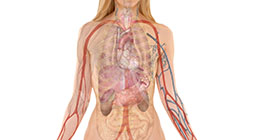
Overview
Symptoms
Causes
Test for Adrenal Function
Prescription
Health Tips
The two adrenal glands are among the most important glands in the body. These small glands secrete the stress-response hormones that guide the body’s reaction to a stressor, as well as small amounts of estrogen, testosterone, DHEA, cortisol and progesterone. The accumulated effects of internal and external stressors have a profound impact on the adrenal glands, an impact that affects all areas of hormonal health.
Each adrenal gland sits on top of one of the kidneys and contains two parts—the adrenal medulla and the adrenal cortex. In response to triggers from the hypothalamus, the adrenal medulla secretes hormones called epinephrine (a.k.a. adrenaline) and norepinephrine. These hormones are part of the “fight-or-flight” response that causes a fast, short-term increase in blood sugar levels, breathing rate, cardiac output, blood flow to the muscles, lungs, and brain, and the cellular metabolism that causes one’s need to escape when perceiving danger.
The adrenal cortex is responsible for the production of a wide range of hormones called glucocorticoids, including cortisol, and the mineral corticoids, aldosterone and testosterone. The hormones produced by the cortex are essential in regulating excretory, immune defense, metabolic, mineral balancing and reproductive functions. This hormone release happens in response to a signal from the pituitary gland and results in a long-term stress response that increases blood glucose. It also suppresses immune response to concentrate energy on dealing with the stressor.
The secretion of hormones by the adrenal cortex in response to stress is one of the most important functions of the adrenals as these hormones help one adapt to the stresses of life over the long term. Various adrenal hormones stimulate the conversion of protein to energy, keeping energy levels high even after the glucose released for the fight-or-flight reaction occurs. The desired result is to run away fast if needed. The adrenal hormones help maintain elevated blood pressure and create changes needed for dealing with such stressors as emotional shocks, infection, high workload, weather changes, environmental chemicals, or physical or emotional trauma.
Over time, particularly a period of continual exposure to stressors, it is possible for the adrenal glands to wear out and become exhausted. Once in a state of exhaustion, the adrenals are unable to secrete the necessary hormones, which if left untreated, could lead to adrenal insufficiency or failure. Adrenal exhaustion is a serious concern because the adrenal glands secrete both male and female sex hormones—estrogens and androgens—and become the prime producers of estrogens, androgens and progesterone, especially in women, when the ovaries retire at menopause.
In today’s world, most women (and people in general) have some degree of adrenal compromise. Working a full-time job, raising children, and juggling hundreds of other demands of daily life can put too much stress for the adrenals to handle. Poor adrenal health undermines a woman’s ability to make smooth transitions inherent in female life. In particular, it can compromise sleep quality, which in turn further compromises adrenal function.
Many medical doctors do not recognize adrenal exhaustion unless the glands become so compromised that disorders such as Addison’s disease or Cushing’s syndrome occur. Until adrenal exhaustion is recognized, the person will most likely have suffered for years from symptoms of under- or overactive adrenal function. Years of chronic stress eventually cause poor adrenal function, but prior to the organ becoming compromised, there are usually periods of overactivity that, if untreated, often result in inadequate adrenal function.
Symptoms
Symptoms of adrenal fatigue:
- Extreme hot flashes and night sweats: Unlike menopausal hot flashes, these are due to stress hormones and can occur in younger women who have not yet entered perimenopause, as well as post menopausal women.
- Insomnia: Typically, the type of insomnia that causes waking in the early hours of the morning (2 to 4 am) without being able to fall back asleep; can also include difficulty falling asleep.
- Reduced immunity: Reoccurring colds, sore throats, cold sores, flu. When cortisol levels remain too high for prolonged periods of time, the immune system becomes suppressed.
- Environmental sensitivities: A body overburdened by stress in the late stages of adrenal fatigue is unable to produce enough cortisol to reduce the inflammation caused by irritants and allergens from food, chemicals, scents, pollens and molds. Histamines (chemicals the immune system produces to protect the body from allergens) go unchecked in the body and levels become too high, causing the immune system to overreact.
- Increased inflammation: When cortisol levels become too low, the immune system becomes overactive; inflammation and autoimmune diseases can become a problem.
- Hypoglycemia: Long periods of unchecked stress will eventually hinder the body’s ability to balance blood sugar levels. This happens when adrenal hormones become too low and insulin levels become too high.
- Poor concentration, brain fog: In an effort to save energy, a body with adrenal fatigue will slow down the processes of the digestive system, leading to inflammation and hindering the gut-brain axis, leading to reduced cognitive function.
- Low energy or chronic fatigue: Caused by depleted cortisol levels; additionally, many of the symptoms of adrenal fatigue, such as insomnia, can increase feelings of fatigue.
- Feeling tired but wired: Feelings of extreme tiredness but being unable to relax, wanting to fall asleep during the day but unable to sleep at night due to imbalances in adrenal function and hormone levels.
- Dizziness upon rising: Hypoglycemia, dehydration, low blood pressure, and a low functioning thyroid can all contribute to feeling of dizziness.
- Irritability, nervousness or anxiety: The hormones produced by the adrenals play an essential role in mood balance. When adrenals become fatigued and hormones become unbalanced, mood changes will occur. Blood sugar imbalances and insomnia will also negatively affect mood.
- Shortness of breath: This may occur more often in those dealing with anxiety or late stages of adrenal fatigue.
- Knee and joint problems: Caused by increased inflammation, poor digestion, liver congestion, a build up of toxic metabolites due to adrenal fatigue.
- Muscle twitching: Due to stress, nutrient deficiencies, insomnia, adrenaline rushes.
- Heart palpitations: May be due to anxiety, stress, caffeine, low thyroid, low blood sugar, low blood pressure and electrolyte imbalance, all of which can occur during adrenal fatigue.
- Sensitivity to light: Stress on the nervous system may affect pupil dilation.
- Digestive problems: Chronic stress and adrenal fatigue can lead to issues such as IBS, leaky gut, candida, heartburn and dysbiosis.
- Cravings for salt, sugar, junk food or stimulants: Decreased aldosterone results in an imbalance in sodium and potassium, which can lead to low blood pressure and an increase in water excretion that may result in severe dehydration. Sugar is craved in attempt to deal with symptoms of hypoglycemia.
Menopausal symptoms resemble those of adrenal fatigue and Cushing’s syndrome, a disease related to overactivity of the adrenal cortex. For example, hot flashes, night sweats, and insomnia, which are common menopausal symptoms, are also symptoms of Cushing’s syndrome, which is caused by chronic exposure to excess levels of cortisol.
Chronic elevation of the stress hormone cortisol is linked to increased bone loss, fat accumulation, infertility and memory loss.
Causes
Sustained periods of high stress lead to adrenal fatigue. Stress comes in many forms and most people feel its effects at some point in life. We may experience physical stress due to poor diet, consuming alcohol or drugs, surgery, injury, physical labour, exercise, chronic diseases, shift work, or insomnia. Emotional and mental stress caused by the loss of a loved one, divorce, moving, job loss, studying for exams, or worrying about money are also draining on the adrenals.
During menopause, the workload of the adrenals increases as these glands are a primary source of sex hormones, including estrogen.
For women, particularly those who come home from a full-time job to care for their families, cortisol remains elevated in the evening when it naturally should subside to allow the onset of sleep.
The Thyroid and Adrenal Connection
The thyroid-adrenal feedback interaction is orchestrated by the nervous system. Stressors on the body and the resulting chronic secretion of cortisol from the adrenal glands have a negative impact on the thyroid gland. When cortisol goes up, estrogens increase. Estrogens block the uptake of thyroid hormone. Stress on the adrenals has a negative effect on the thyroid, causing reduced uptake by thyroid hormone receptors and low thyroid hormone output. Adequate amounts of thyroid hormone are needed to make cortisol function properly and vice versa. These two hormones are interdependent in that they share many of the same deficiencies or excess symptoms when they are not in balance.
When the adrenal glands are overworked due to stress, working too much, not enough sleep, or poor diet, the body converts progesterone into adrenal hormones, which depletes the body of progesterone. Thyroid hormones and progesterone feed information back to the pituitary, helping to balance other hormones and thereby help the adrenals with stress adaptation, which like the thyroid, are stimulated by the pituitary. When progesterone levels are low because of its conversion into stress-fighting hormones, the thyroid then has to take on the task of sending hormones to the pituitary with little outside help.
The thyroid determines the body’s metabolic rate. If adrenals are depleted, the thyroid will force them to maintain the proper rate. However, this type of pressure on the endocrine system over time leads the thyroid to decrease hormone production to conserve energy. When this first happens, symptoms of low levels of both adrenal and thyroid hormones occur. If the symptoms are not addressed, over time they will come to be predominantly related to one gland or the other, usually the thyroid.
Tests for Adrenal Function
A test of postural (orthostatic) blood pressure is an easy, in-clinic assessment of adrenal function. A blood pressure reading is taken once while the patient is in the reclining position, and twice when the patient is brought to a standing position. In a normal response, the blood pressure will be approximately 10 mg/ hg higher in the standing position than in the lying position.
With adrenal insufficiency, the blood pressure will drop 5 mg/hg or more when the patient moves from the lying to standing position. Generally, the orthostatic blood pressure is a reliable indication of the adrenal state, with a few exceptions: athletes and people taking cortisone.
Competitive athletes are constantly pushing their adrenal glands to the point that the adrenals are constantly in overdrive, making it difficult to assess adrenal function based on this measurement only.
Those taking prednisone, or other forms of cortisone, will not be able to use this simple test as the drugs mask normal adrenal function.
Blood Sugar Imbalance and Adrenal Function
One of the most common conditions that we see in people of all ages is functional dysglycemia (blood sugar dysregulation). Glucose (blood sugar) is the main fuel for the brain and is required by all the cells of the body. Thus, it is important to maintain balanced blood glucose levels, adequate for meeting demand. Women in particular have difficulty with the metabolism of carbohydrates and the result is dysglycemia.
Blood sugar illnesses such as diabetes and hypoglycemia are well-recognized and easily diagnosed by looking at fluctuations in blood glucose levels and the associated symptoms. Subclinical blood sugar dysregulation, called dysglycemia, however, often cannot be confirmed by fasting blood glucose tests. Symptoms are very similar to those produced by the more serious blood sugar imbalances, though not as dramatic. The main symptoms include, but are not limited to anxiety, fatigue, irritability, and poor concentration. Symptoms generally occur two to three hours after carbohydrate ingestion.
There are laboratory blood tests that may be helpful in assessing dysglycemia: the two-hour postprandial (post-meal) blood glucose test, the four- or six-hour glucose tolerance test, or the more sensitive four- or six-hour glucose and insulin tolerance test. The fasting blood glucose test (the most routinely done) is a single, isolated measurement and cannot provide information on overall blood glucose regulation.
Prescription For Health
Diet
Diet, lifestyle, and supplements are all important factors in supporting adrenal health.
Certain foods increase oxidative stress in the body, which can add stress to the adrenal glands. In addition, these foods can negatively hinder nutrient absorption in the body, robbing it of key nutrients needed for optimal adrenal health. Poor quality foods should be avoided. Instead, a wide variety of nutrient dense foods should be consumed.
Foods to avoid:
- Alcohol
- Caffeine (coffee, black tea, chocolate, soft drinks)
- Fried foods
- Processed foods
- Sugar
- White flour, white rice
Foods to include:
- Fruit, two to four servings each day
- Healthy fats (borage oil, avocado oil, extra virgin olive oil, coconut oil, grass-fed organic butter)
- Organic, plain, whole fat yogurt
- Quality proteins (organic chicken and eggs, organic lean meats, wild fish, beans, nuts and seeds)
- Vegetables, five to seven 1/2 cup servings each day, organic if possible
- Whole grains (millet, buckwheat, amaranth, oat grouts, quinoa)
Lifestyle
Take a vacation. A 2016 Vacation Deprivation study found that on average Canadians are leaving 31 million days unused every year. Vacations are an important part of mental health. If money is a worry, take time off at home to rest, do hobbies, see friends and family. If prolonged time off work makes for a stressful workload upon return, book multiple long weekends instead of one big holiday.
Everyday emotions can be a huge source of stress, especially emotions that are not being addressed. It is important to process negative emotions instead of repressing them. Sadness, guilt, anger, resentment and even jealousy are all perfectly normal human emotions that all will feel sometimes. Allow space to feel and work through these emotions so they can be let go. Seek professional help or therapeutic counseling if needed.
Get help in dealing with grief. The loss of a loved one, a divorce, or the loss of a job all produce grief, which is a form of chronic stress on the body. When grief is not dealt with, the immune system becomes suppressed, especially in the elderly.
Research has shown that exercise has a stress relieving affect on the mind and a calming affect on the body. Just twenty minutes of walking will have a beneficial affect and should be done almost every day.
Breathing is a powerful de-stressing tool. Several times per day, breathe in through the nose and fill the lungs with air until the abdomen rises. Then slowly exhale from the mouth until lungs are empty. Repeat this cycle five times and practice anytime needed.
Supplements
Adaptogens are herbs that assist the body in adapting to stress by supporting the adrenal glands. Adaptogens have a normalizing effect, regardless of the condition. They help the body maintain the constant internal state necessary for health and life itself. For example, if blood pressure is high, an adaptogen will help lower it; if it is low, the same adaptogen will help normalize it. Stress increases the body’s need for specific nutrients such as the B vitamins, antioxidants and omega-3 fatty acids. A nutrient dense diet is especially important during times of stress and when recovering from adrenal fatigue.
| Nutrient | Dosage | Action |
|---|---|---|
| Rhodiola
(Rhodiola rosacea) |
100 mg | Helps reduce the effects of stress, is anti-aging, regulates the heart by increasing oxygen utilization. |
| Suma
(Pfaffia paniculata) |
100 mg | A regenerative tonic used for nervous, reproductive, hormonal and digestive disorders. |
| Sensoril® Ashwagandha
(Withania somnifera) |
62.5 mg | Improves energy, supports the immune system, is anti-oxidant and anti-inflammatory, improves sexual performance.
Aids conversion of T4 to T3 thyroid hormone. |
| Schizandra berries
(Schizandra chnensis) |
80 mg | For insomnia, nervousness, supports the liver, improves physical endurance. |
| Magnesium bisglycinate or threonate | Elemental
250 mg – 500 mg |
Supports the nervous system and adrenal glands; helps to reduce insomnia. Alleviates heart palpitations; essential for proper heart muscle function; supports healthy blood pressure. |
| Coenzyme fully reacted B-complex | Look for a minimum of the following per daily dose:
B1 – 100 mg B2 – 7.5 mg Niacin – 353 mg B5 – 300 mg B6 – 100 mg B12 – 1000 mcg Folate – 1000 mcg |
Improves mood, reduces anxiety and stress; aids hormonal balance. B vitamins in their active coenzyme form are absorbed directly. |
| Omega-3 Fatty Acids | 1500 to 3000 mg per day | Helps support adrenal system. |
| GABA | Helps reduce anxiety, stress reduction, insomnia. | |
| Theonine | For stress reduction, stress reduction, insomnia. | |
| Phosphatidyl serine phosphatidic acid (lipogen) | Anxiety and insomnia |
Health Tips to Fight Stress
- Accept help and support from family and friends; many people have a hard time accepting care from others.
- Be a person that practices self-care; use the same self-talk as if speaking to a best friend. Don’t focus on weaknesses or minimize strengths. Wake up each day and declare aloud, “I’m a good and useful person”.
- Believe in oneself and do away with negative self-talk and self-doubt which continually hamper the body’s ability to heal.
- Carpe diem; seize the day and live it to the fullest. Don’t worry so much about tomorrow.
- Develop hobbies. Live out dreams doing the things always desired. Learn to waterski, sing in a choir, write a book, tell stories to children, take walks, or garden.
- Eat 7 to 10 half-cup servings of vegetables and fruit every day.
- Get 8 hours of sleep every night and try to sleep until 7:30 in the morning.
- Get help to process feelings of grief.
- Have TSH tested to rule out a low functioning thyroid.
- Just say no when there is too much to accomplish in one day.
- Practice breathwork.
- Process negative emotions instead of repressing them.
- See beauty. Smell the flowers, watch the sunset and listen to the wind.
- Seek a spiritual interest. This does not have to be religious, although those with strong religious beliefs generally live more at peace and feel protected. Find something that helps find the quiet place within. This could come from being in nature, meditation or being physically active.
- Share the household workload with family.
- Studies have shown that listening to one’s favourite music lowers stress levels and improve mood.
- Take a vacation!












